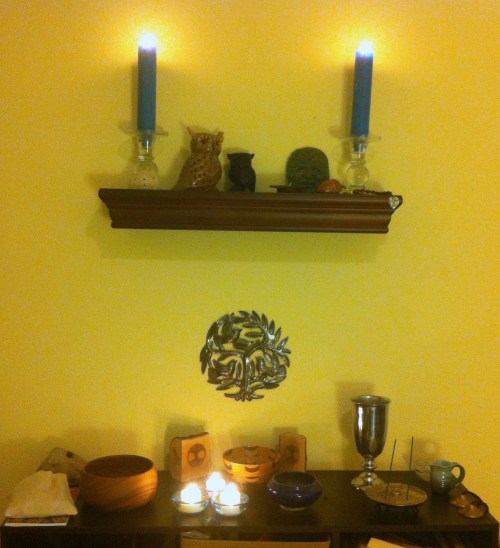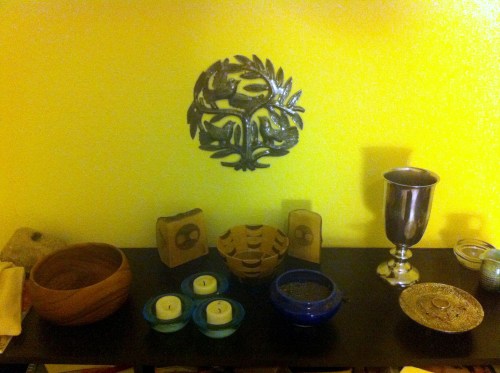As a note – this is a fuzzy sort of post. I’m not really sure exactly what I’m doing, since as a meditation exercise, this is pretty new for me. Still, I’ve been asked to put together what I have so far, so here goes!
Before I start my visualizations, I do a grounding and centering meditation, like the Two Powers meditation. You generally want your mind to be stable and clear before you start introducing new imagery to it, and I need to get better at the Two Powers meditation anyway, so I’m using that one. Any grounding and centering meditation will work.
I start my visualization exercise by creating a Hallows (a Fire, Well, and Tree, consecrated as the Sacred Hallows, ADF style). I like to do a simple consecration of each, followed by sprinkling and censing the area while saying “By the Might of the Water, and the Light of the Fire, this Grove is made whole and holy.” This sets up a ritual space that I do need to take down at the end (don’t forget that part), but isn’t a formal ritual where I need to worry about offerings to the Kindreds.
I do make an offering of incense to the gatekeeper though. I’ve tried this with Cernunnos and with Garanus (the Crane), and it worked equally well both times, though I liked the energy of Garanus better. I ask the Gatekeeper to open the gates and to help me to feel their power as the sacred center.
Because I play video games, the main image I’ve been using for this type of connection is that of a Portal – an oblong “hole” in the fabric of the universe that you use to travel from this place to some other, presumably distant (or just different) place. Depending on the game, these are either cast by magical spellcasters, read from a scroll that enables a portal, or fired out of a dimensional portal gun that you point at things. Still, the image is pretty consistent – you get a glowy sort of oval that you can step through and be transported to another place.
Since that image is one that is ingrained in my brain pretty strongly, it’s something I can refer to easily and that works with the kind of image and connection I’m trying to build. If you have no idea what I’m talking about, think about maybe an arched doorway, or the center of a ring of standing stones, or even a tunnel. Watchers of science fiction television shows might envision something like a stargate. Basically, you want an image that works for you, that suggests an opening from wherever you are now into another place that might be distant or otherwise removed.
After you do your grounding exercise, I start to visualize a portal.* (I’m going to use the term portal since that’s the image I’m using. Feel free to substitute in a word that suits your own imagery better!) I concentrate on seeing in my mind’s eye this dimensional opening that leads into an unknown place. I try to see the edges of the portal grow distinct, and they glow slightly, but are a little out of focus. In the center there are stars – sort of like the deep, universal stars that you’d see in a truly dark place on a night with no moon. Endless sorts of stars.
And as I peer into that portal, from my little Hallows, I start to put together other portals, there in that deep dimensional starry place. Those portals lead to other Hallows, which I can’t quite see, because as a solitary, I really am working off my own imagination (with a little help from YouTube) about what other Hallows might look like. But there are always fires, or wells, or trees, or all three. Some of them are elaborate, and others are simpler, like my own. They are imaginary Hallows, kind of like my Mental Grove (which, now that I think of it, is a place I should be trying this work from!) You could think of this step like a hallway of other “doors”, or, if you’re using the stone circle imagery, as though you’re looking through stones on one side, but can see portals out between all the other stones.
Basically I’m trying to establish that even though I’m here in my own Hallows, I’m connected through that sacred center to all the other Hallows, both linearly in space and vertically in time. I’ve not tried actually looking for any specific places to visit, I’m just looking to create that connection to something bigger.
Once I’ve sat for awhile and built up the visualization, I slowly allow my mind to come back to center and present, usually by making sure I’m mentally back in front of my own Hallows instead of out looking around. When I’m solidly back in myself, I close the Gates (with the help of the Gatekeeper), and return the fire, well, and tree to their normal, material selves. The whole process makes for a smallish ritual that takes 5-15 minutes, depending on how long you work with the meditative aspect of the visualization.
I think repeating this exercise will help me fine tune it (right now it’s a little fuzzy still, since I don’t have a clear picture of what I want to do). I also think practice will help me think less about the actual setup and more about what the experience/visualization is symbolizing. Right now I still feel more like I”m setting it up, and less like I’m actually connecting to anything. I don’t wonder if the reason I had better luck with Garanus as a Gatekeeper was simply that I’ve got a stronger connection to the Nature Spirits than I do to the Gods and Goddesses, of any stripe. (Not to mention my lack of a true hearth culture – I sometimes work in Celtic, but I have been drawn to Gaulish lately) I want to really *feel* a connection to the sacred center though, especially since creating it is such a big part of the CooR, and since feeling that connection is a big part of having a religious experience, for me.
Read Full Post »



